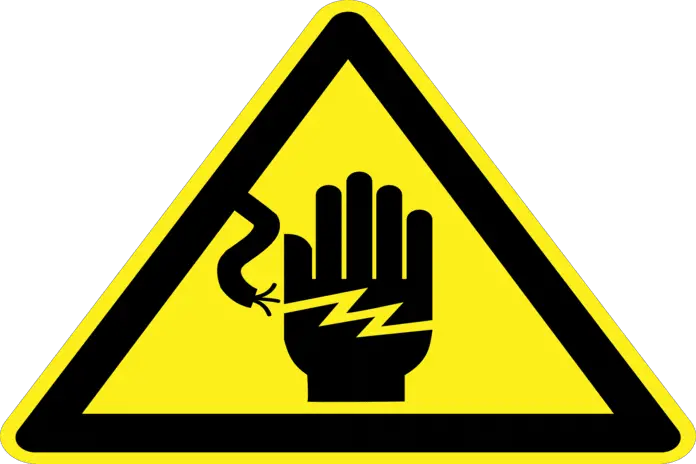
You should have high respect for something that you can’t see but could harm you. Electricity falls under this category. Batteries generate electricity so treat it with care. That’s why, before you even attempt to work on your car battery, ask and find out the answer to the question, can a car battery shock you or electrocute you? Lucky for you, I already asked and found the answer which I am sharing with you today.
So, can you receive a shock from a car battery? No, a 12-volt car battery won’t shock you. All you will feel is a tingle in your hands and fingers if you touch both terminals of a car battery while your hands are wet.
Why Does A 12-Volt Car Battery Not Shock You?
Although a car battery has a high enough amperage that could kill you, it does not have enough voltage even to give you a shock. The measly 12 volts of a car battery does not have sufficient pressure to drive a substantial amount of amperage past your skin’s contact resistance. That’s the reason why you won’t get a shock even if you touch the positive and negative terminals of a car battery.
On its own, a typical car battery stores plenty of energy and, without doubt, has sufficient amperage, but the problem is delivering that energy past your body and skin to a ground point.
The crux of the matter is the voltage of the battery. Volts serve as the force being exerted on the electrons in the battery as they attempt to discharge from the negative terminal to the positive terminal to complete a circuit. A regular car battery is a 12-volt battery. This voltage does not deliver enough pressure or force on the electrons strong enough to penetrate the human skin which has a higher resistance.
With the skin’s greater resistance, the electricity cannot flow. Thus, no sensation is experienced.
That doesn’t mean though that your car battery won’t sometimes give you a little prickle. This could happen if you touch the battery terminals when you are wearing clothes wet from the sea, or you are bathed with sweat. The salt water in your clothes or sweat will serve as a conductor of the electricity, and you will feel a small amount of electrical sensation. If you are in perfect health, this will not cause you any harm, much more be fatal.
A 12-Volt Battery Can’t Shock You But A 12-Volt Electrical System Can
Even though you won’t get a shock from touching both terminals of a car battery because of its low voltage, other components of a car’s electrical system can surely give you a severe shock.
An example would be the ignition system with a rotor and cap. In this ignition system, an ignition coil works to provide an enormous amount of voltage needed to drive a spark over the gap of air of a spark plug. You will definitely get a shock if you come in contact with a coil wire or wire of the spark plug with ripped insulation while at the same time touching ground.
You get such a sensation when coming in contact with a frayed spark plug wire, yet you don’t feel anything when touching the terminals of a battery because the voltage delivered by the ignition coil is substantial enough to penetrate your skin’s contact resistance.
Of course, being “electrocuted” by the wire of a spark plug isn’t fatal, but it’s still sensible to avoid it. This is particularly true when dealing with a distributorless ignition system with a higher voltage.
Hazards Posed By A Car Battery
Just because a car battery won’t shock you doesn’t mean that it is entirely safe. The innocuous-looking battery can also pose a danger to life, limb, and property, but of a different kind. Here are some of the hazards associated with a battery.
Explosion
The most serious danger that a battery can bring is an explosion triggered by “gassing” ( “gassing” will be explained more extensively later in this article), the release of hydrogen gas by the battery. Even if only a single tiny spark ignites the hydrogen gas, the battery could explode and shower you with sulfuric acid.
An explosion can also be triggered by a detonating spark arising from terminal clamps that are not properly secured as well as from rigid battery cables which have loosened from the battery. Batteries must be protected from vibration and excessive motions with cables that are adequately supported.
Never use solid bar connectors for this purpose. Good quality flexible wire or cable that is suitably sized will cushion the battery from slight vibration or motion. It could also eliminate the pressure from the terminal connectors where sparks could occur.
Gas poisoning
Gas poisoning is another hazard you will face when working with batteries. You can inhale the poisonous hydrogen sulfide, another nasty gas released by the battery, though “gassing.”
The possibility of being poisoned to death by inhaling hydrogen sulfide released by a single battery is minimal. But, be aware that you’re releasing the noxious gas in the air while working on your battery when the smell of rotten eggs fill the air. Inhaling hydrogen sulfide isn’t fatal, but it sure can cause some severe health problems such as lung and throat irritation that could make you suffer for days.
Bridging the battery to ground
One other hazard posed by a car battery is the accidental bridging of the terminals or a connector or +B wire such as the starter solenoid to ground. When a metal wrench or any piece of metal, which has a lot less resistance than your skin and body, bridge the positive terminal to ground, it can get red hot and burn your hands. It could even generate sparks that could cause a fire or explosion when the spark merges with the hydrogen gas.
Acid burn
The electrolyte of a car battery contains sulfuric acid that is highly corrosive to tissues and metal. When your skin gets in contact with the substance, however small the amount is, you can get a really nasty burn, especially when not attended to immediately. Running cold water in the affected area of the skin will mitigate the condition of an acid burn. A small drop or splash of it can also bore a hole in your clothes.
Wearing protective gears such as rubber gloves, goggles, an old shirt with long sleeves and footwear that cover the toes are a must when working on a battery. Having a pail of water close by is also required so that you can swiftly wash off the acid from your skin.
What Is Battery “Gassing”?
Battery gassing is when a lead-acid battery releases hydrogen gas and hydrogen sulfide in the air. Normal gassing occurs when a battery is charged. But when a lead-acid battery is overcharged, oxygen and hydrogen gasses form because the electrolyte solution overheats. This condition increases the pressure inside the battery and causes excessive gassing that could become dangerous.
Hydrogen gas is not toxic, but it is a very explosive gas. A high concentration of this gas can cause an explosion triggered by even a single spark. A spark from connecting or disconnecting a battery terminal from the charging system is enough to cause an explosion to happen.
Hydrogen sulfide, on the other hand, is a poisonous gas. Although inhaling hydrogen gas released by a single battery will not kill you instantly, it could cause you some discomfort.
Hydrogen sulfide has the nasty odor of a rotten egg. Once you smell the stink, you will know that it is in the air. Regrettably, your sense of smell gets desensitized after a while, and you forget that you’re breathing in the noxious gas. Protracted exposure to it could result in lung and throat irritation that will make you suffer for days.
To prevent problems arising from gassing, you are well advised to charge your battery in a well-ventilated place, or better yet, in the open air.
Conclusion
It is not so much a question of can a car battery shock you that should concern you, but whether a car battery can do you damage. A car battery won’t shock you, but it definitely can do you harm if you do not exercise caution when handling it. The gravest threat in working with a battery is fire and explosion, although an acid burn could also be serious.
One other thing to watch out for concerning batteries is the car’s electrical system itself. Although a battery can’t shock you, other components of the car’s electrical system such as the spark plug can deliver a strong enough jolt that may not be crippling, but still alarming.





